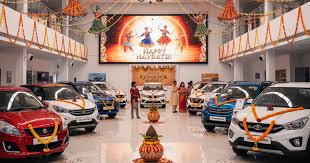
GST 2.0 Boosts Car Sales in India
The launch of GST 2.0 on September 22 has brought a significant change to the automotive landscape in India. Major car manufacturers like Maruti Suzuki and Tata Motors have reported record numbers of inquiries and sales. Maruti Suzuki received an astounding 80,000 inquiries and delivered 25,000 cars on the first day, a feat not seen in over three decades. Tata Motors also experienced heightened activity with 25,000 inquiries and 10,000 deliveries.
This surge in car sales can be attributed to multiple factors, including pent-up demand from consumers who hesitated to buy before the new tax regime. Many potential buyers were waiting for the implementation of reduced GST rates, particularly for small cars, which now fall under a lower 18% tax slab compared to the previous 28% plus cess. Additionally, the end of the Shraadh period and the upcoming festive season created a perfect storm for increased car sales.
Maruti Suzuki's head of marketing, Partho Banerjee, noted the overwhelming response from customers, stating that they have received 75,000 bookings since announcing price cuts, with approximately 15,000 bookings coming in daily. This represents a 50% increase over their usual sales figures. The demand for small cars has been particularly strong, with bookings growing by nearly 50%, leading to concerns about stock shortages.
However, the situation preceding GST 2.0 was quite different. Showrooms were quiet as dealers braced for substantial discounts following the tax reduction. Many cars were stuck in inventory because consumers were reluctant to purchase at older rates. This has put dealers in a challenging position, with estimates suggesting losses could amount to Rs 2,500 crore, jeopardizing their working capital.
The Federation of Automobile Dealers Association (FADA) expressed concerns over the transitional issues faced by dealers. They highlighted the risk of lapsing credits in GST, which could create further financial strain. Despite these hurdles, the positive shift in consumer interest marks a pivotal moment for the auto industry in India.
In conclusion, while car sales have received a significant boost under GST 2.0, the journey ahead for dealers remains complex. The revival of consumer interest, particularly in small cars, is a promising sign for the industry, indicating a potential recovery from recent sluggishness.











